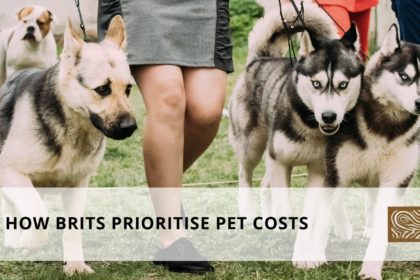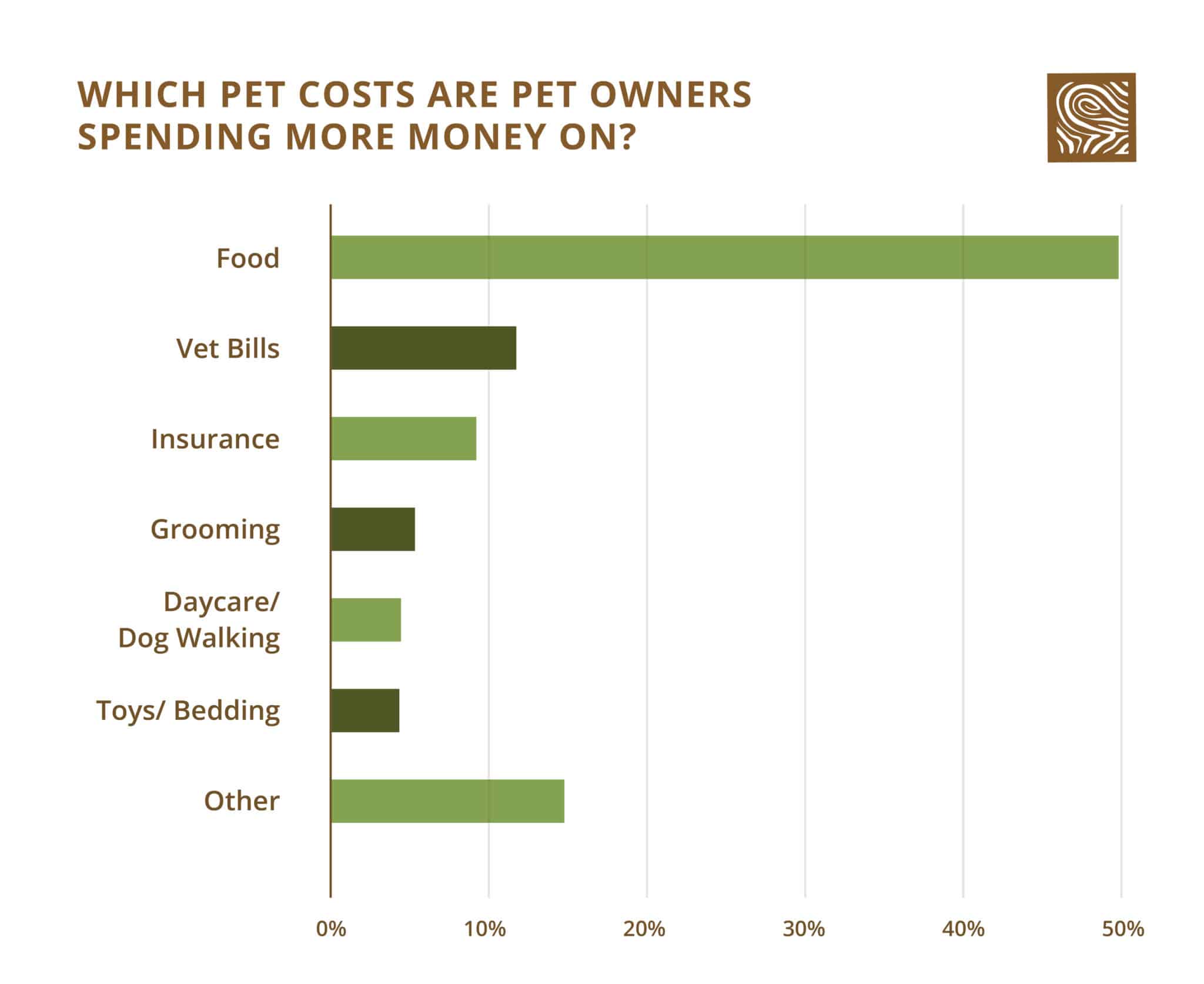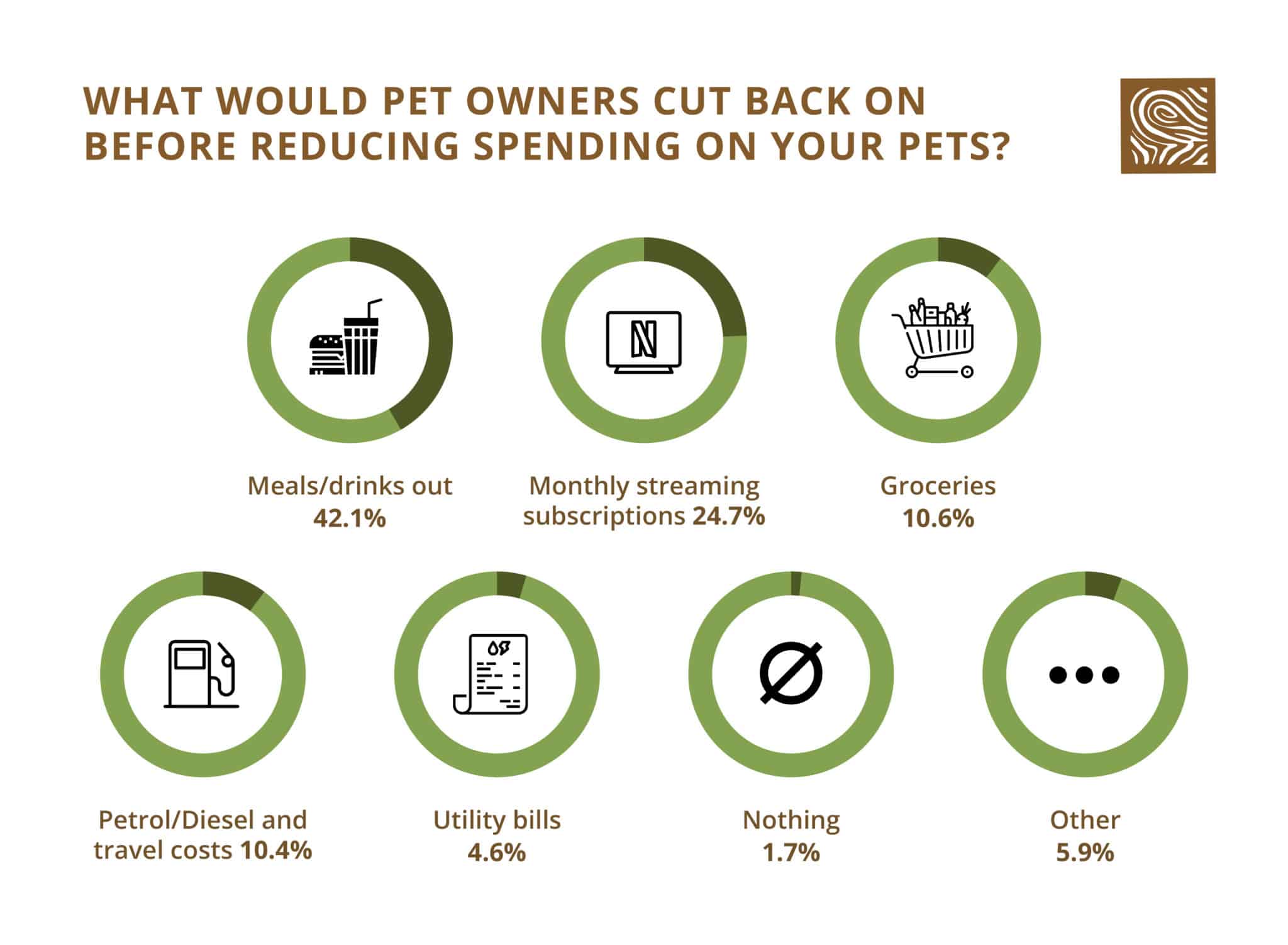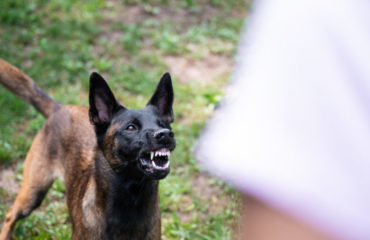How Brits Prioritise Pet Costs

The cost of living increase has seen a lot of people cutting back on everyday luxuries to pay for necessities. But have increases in the cost of living changed how we spend on our pets?
We have explored the pet costs that have risen over the last couple of months and which outgoings pet owners are cutting back on to pay for their pet’s needs.
The following article will explore the results of the survey that over 500 pet owners completed.
Pet Costs That Have Risen With The Cost of Living
With the cost of living increasing, so is the price of owning a pet. We surveyed 500 people and asked them: With the cost of living increasing, which pet ownership costs are you spending more on?

Food
The majority (49.8%) of pet owners we surveyed agreed that the cost that has risen the most is pet food. There are plenty of options for pet food out there, including tailor-made dog food subscription services.
Making your own homemade treats can reduce the amount pet owners spend on their pets’ diet. To find out more about which flavour treats dogs prefer, read our recent blog post here.
Substituting table scraps into your pet’s diet is far more complicated however, as you must research the foods that are appropriate to your pet and consult a nutritionist if you are substituting large amounts of table scraps for kibble.
Vet Bills
11.8% of pet owners have seen an increase in their spending on vet bills. So, what can you do to look after your pets’ health at home?
Weight management is one of the best ways to decrease your trips to the vet. A dog within the parameters of a good weight for their breed is less likely to have weight-related problems such as diabetes and breathing issues.
Ensure they have a balanced diet and an appropriate amount of exercise and playtime for their breed.
Pet Insurance
9.3% of pet owners agree that their pet ownership expense that has increased the most is pet insurance.
Many new pet owners ask the question: Is pet insurance needed? Although legally, your dog or cat has to be microchipped, it isn’t mandatory to have pet insurance. Charities such as the RSPCA encourage pet insurance to cover extraordinary circumstances like accidents, illness and unplanned treatment.
Pet insurance costs can vary from pet to pet – the premiums depend heavily on the breed and age of the dog as well as the pre existing conditions that the pet may have. You may find that insuring your pet from a young age is one of the best ways to secure the best price.
Grooming
The average cost of grooming has risen across the UK, with 5.4% of the surveyed pet owners highlighting that this is the main cause of their increasing pet-related outgoings. With the high volume of dog purchases over the last couple of years, grooming services are more in demand than ever, so securing a grooming slot costs more.
How often does your pet need grooming? For most dog breeds, a grooming session every 1-3 months ensures that your dog has a healthy, well-maintained coat. However, this will depend on your dog’s coat. An interim job such as nail clipping is recommended once or twice a month by The Kennel Club.
Daycare/Dog Walking
Many pet owners are going back to work in an office or onsite instead of working from home full time. This has resulted in more pet owners needing daycare and dog walking services more often. 4.5% of pet owners agree that their spending on daycare/dog walking has increased.
Depending on your pet, a varying amount of care is needed when you’re not there. If your pet is relatively calm on their own, then less daycare/dog walking from a professional will be required. It is recommended that dogs aren’t left on their own for more than 4 hours at a time. With a puppy or older dog, the owner will need to come home more frequently than this. Breaking alone time up and being with other dogs is a great social activity and allows the dog to get its daily exercise.
Toys/Bedding
4.4% of pet owners have seen an increase in the cost of bedding and dog toys.
Dog beds should be replaced every 1-5 years, depending on the level of wear. If you see any holes, tears or loose strings on a dog’s bed or their toys, these should be replaced immediately to prevent the risk of choking.
The remaining 14.8% of the surveyed public responded that they are spending more on other aspects of their pet.
What would you cut back on before reducing spending on your pets?

Meals/drinks out
Cutting back on eating at restaurants and drinks out is the first thing that two in five pet owners do as they are faced with higher costs for pet ownership. Of the 500 pet owners we surveyed, 42.1% of the surveyed pet owners agree that they will reduce the amount of meals/drinks that they go out for, in order to pay for pet costs.
Monthly streaming subscriptions – Netflix, Amazon Prime
Streaming service charges quickly add up, especially when families have more than one subscription. Earlier this year, new figures revealed that 1.51 million Brits cancelled streaming services, with half a million of these cancellations due to cost. One in four pet owners agree with this result, with 24.7% of those surveyed confirming that they will axe services like Netflix and Amazon Prime to pay for their pets’ needs.
Groceries
The weekly shop has massively increased in price, alongside the increasing cost of dog food. As a result, 10.6% of pet owners are planning to cut back on their weekly food shop to help pay pet ownership costs.
Petrol/diesel and travel costs
Petrol and diesel prices are at an all time high, with these cost increases being a key driver of inflation across the UK. 10.4% of pet owners are prioritising reducing the amount of travelling they do to save cash for pet-related purchases. Drivers may choose to stop taking short journeys, lower average speeds, or dabble in hypermiling techniques to increase their car’s fuel efficiency.
Utility bills (electricity/gas)
4.6% of pet owners are cutting back on utility bills to afford their pets. This may involve reductions in spending on heating and reducing water consumption.
Nothing
Just 1.7% of pet owners don’t feel the need to reduce any of their outgoings in order to spend money on their pets.
So, there we have Benchmark Kennels breakdown of spending on pets across the UK. If you are unsure of how much money to set aside for your pooch, check out the PDSA advice on lifetime and monthly costs.
About Benchmark Kennels
Benchmark Kennels provide a range of bespoke outdoor dog kennels designed for the comfort of all dog breeds, shapes and sizes. The team crafts thermal dog kennels, insulated dog cabins, and wooden dog kennels to suit all requirements. Every kennel is handmade to order, with professional fittings to give you peace of mind that your dog kennel is secure and weatherproof.
The team attends trade shows, promoting the benefits of providing a space for your dog away from the bustle of the home and family.
Benchmark Kennels are trusted suppliers to the National Trust, Balmoral estate, the Royal Family of Abu Dhabi, Country Estates, top dog breeders and pet owners nationwide.
8 Comments to “ How Brits Prioritise Pet Costs”
You must be logged in to post a comment.





… [Trackback]
[…] Here you can find 18679 additional Info to that Topic: benchmarkkennels.co.uk/how-brits-prioritise-pet-costs […]
… [Trackback]
[…] Read More Info here to that Topic: benchmarkkennels.co.uk/how-brits-prioritise-pet-costs […]
… [Trackback]
[…] Read More Info here on that Topic: benchmarkkennels.co.uk/how-brits-prioritise-pet-costs […]
… [Trackback]
[…] There you can find 64244 additional Info to that Topic: benchmarkkennels.co.uk/how-brits-prioritise-pet-costs […]
… [Trackback]
[…] Here you can find 20548 more Info to that Topic: benchmarkkennels.co.uk/how-brits-prioritise-pet-costs […]
… [Trackback]
[…] Information to that Topic: benchmarkkennels.co.uk/how-brits-prioritise-pet-costs […]
… [Trackback]
[…] Here you can find 56185 additional Info to that Topic: benchmarkkennels.co.uk/how-brits-prioritise-pet-costs […]
… [Trackback]
[…] Here you can find 59432 additional Information to that Topic: benchmarkkennels.co.uk/how-brits-prioritise-pet-costs […]